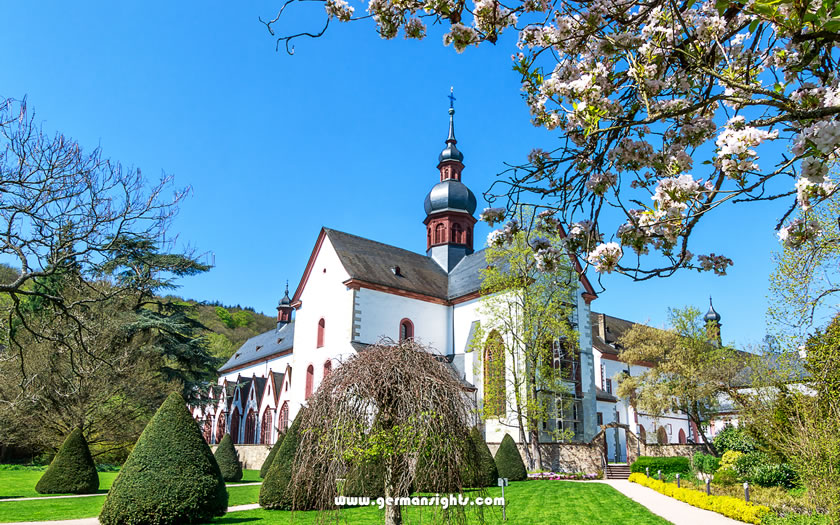Eberbach Abbey ('Kloster Eberbach' in German) is a stunning example of medieval architecture and centuries of winemaking tradition in the beautiful hills of Germany's renowned Rheingau region.
This former Cistercian monastery, founded in 1136 by Bernard of Clairvaux, is a must-visit for anyone interested in Romanesque and Gothic architecture, history, and wine culture.
It is not far from Eltville am Rhein and can be easily reached from major centres such as Frankfurt, Wiesbaden or Mainz.

Eberbach monastery near Eltville
Eberbach Abbey is one of Germany's best-preserved medieval monasteries. The Cistercian monks set up the monastery in 1136 in the Rheingau wine region, about 15 kilometres west of Wiesbaden.
The monks picked this spot because it was isolated and there was a stream nearby (the Eberbach). The abbey was built in stages between 1140 and 1200. During the Middle Ages, Eberbach Abbey became one of the largest and richest monasteries in Germany. The monks made their money from wine production and wool trading.
The abbey's architecture shows both Romanesque and early Gothic styles. Its most notable features are the basilica, dormitory, and wine cellars. The wine cellars are still in use today – the abbey still produces and stores wine from its vineyards.
The abbey closed in 1803 after nearly 700 years of monastic life. The buildings were used for different things, including as a prison and asylum. These days it functions as a cultural centre and event venue. Many visitors know it as a filming location for "The Name of the Rose" (1986).
You can visit most parts of the abbey year-round. The guided tours explain the monks' daily life and the abbey's wine-making history. Winter visits can be cold – the stone buildings have minimal heating. Summer offers better weather but brings more tourists.
Wine has played a big part in Eberbach Abbey's story for almost 900 years. The Cistercian monks planted their first vines here in 1136, and today the estate manages about 200 hectares of vineyards.
The monks chose the Rheingau region for good reason. The south-facing slopes, slate soil, and Rhine River's influence create perfect conditions for Riesling grapes. In medieval times, the abbey produced up to 100,000 litres of wine annually.
You can still see Eberbach Abbey's wine legacy all over the property. The 1668 wine press is a great example of the centuries of winemaking tradition here. The abbey has some huge medieval cellars underneath it, with space for 1.2 million bottles. These dark, cool spaces are perfect for storing wine, just as they were in medieval times.
The abbey's vineyards are some of Germany's most prestigious sites. The Steinberg vineyard, which is enclosed by a historic stone wall, produces some particularly notable wines. Riesling is by far the most popular grape here, making up 85% of all the wines we produce. This grape variety really does well in the Rheingau's unique climate and soil conditions.
The Hessische Staatsweingüter (Hesse State Wineries) is now in charge of wine production at Eberbach. They mix modern winemaking techniques with traditional methods that have been developed over centuries.
The abbey runs regular wine cellar tours, although the English sessions are less frequent than the German ones. You can taste the wines on offer at the abbey, and you can also buy bottles directly from the shop. A wine festival is held every August to celebrate the tradition.
The abbey welcomes visitors year-round, though opening hours vary by season. From April through October, doors are open daily from 10.00 to 18.00, while winter months (November to March) see slightly shorter hours from 11.00 to 17.00. The abbey is closed on 24, 25, and 31 December.
It's a good idea to book cellar tours in advance, especially during the busy summer months. A typical tour lasts around 90 minutes and gives you a great insight into both historical and current winemaking practices.
Just 45 minutes from Frankfurt Airport, the abbey is easy to get to by car or public transport. If you're driving, just follow the signs to Eltville and then to Kloster Eberbach. If you're taking the train to Eltville station, you can then hop on a bus or a taxi to the abbey.
Website: kloster-eberbach.de
If you know when you are planning to go but haven't decided on accommodation, then use the map below to get an idea of which properties are available and to compare prices during the period you wish to travel.
Enter your proposed dates and use the '+' to zoom in on a location and reveal more properties. Click on the price above a property to see more information.